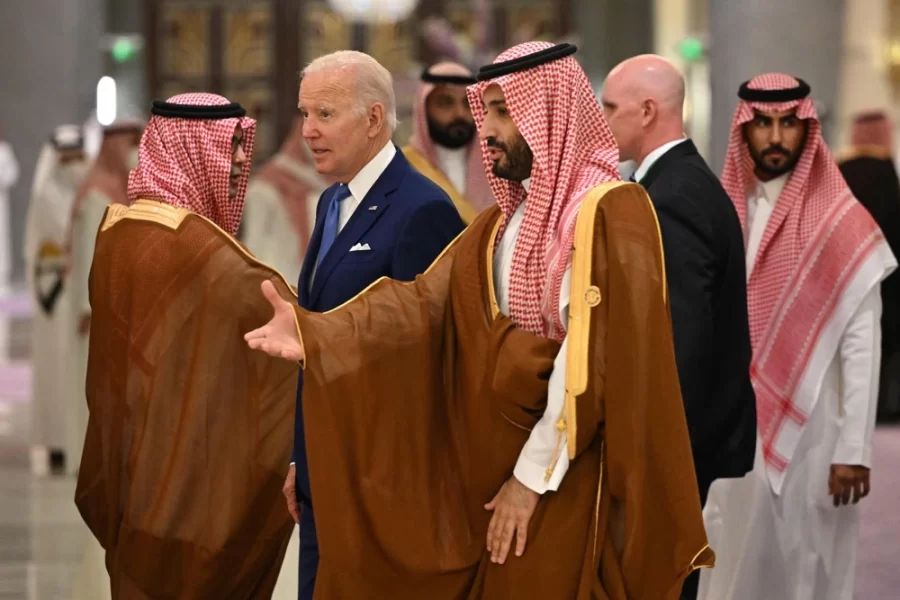Saudi Arabia and US’s deteriorating relationship
President Joe Biden traveled to Saudi Arabia in July to meet Prince Mohammed Bin Salmam and discussed the ongoing oil prices. Both sides continue to threaten and accuse one another; therefore, the relationship continues to degenerate and can potentially lead to the destruction of the US economy. The US now considers questioning and reviewing its relationship with Saudi Arabia.
November 17, 2022
President Joe Biden traveled to Saudi Arabia this past summer to discuss an increase in oil with Muhammed bin Salman, failing to persuade him. The US and Saudi Arabia’s relationship started to dwindle since the Obama administration started developing diplomatic relations with Iran. Originally, the US and Saudi Arabia’s relationship started on the deal that the US will protect Saudi Arabia’s oil in exchange for a share of it. However, Saudi Arabia and the US experienced a rocky relationship lately due to the disagreement. If the relationship continues to deteriorate, it will lead to catastrophe in the US economy, potentially affecting the security of millions of Americans. This relationship remains crucial to the country because oil dominates the nation’s infrastructure.
Saudi Arabia leads the Organization of the Petroleum Exporting Countries (OPEC), which cut oil production in early October and led to gas prices rising. OPEC announced in early October that it will decrease oil production by 2 million barrels a day from this month. The US threatened to stop selling its weapons to Saudi Arabia which helps the country to protect itself against Yemen. If Saudi Arabia stops selling its oil in US Dollar currency, it would pose a threat to it, breeding a scenario promoting extremely expensive oil prices. Saudi Arabia also threatened to dump US debt on them, the US currently owes between 119 billion dollars in oil and gas according to the Treasury Department data.
“The US does not have that kind of money to pay, so then our debt will increase tremendously. The thing is, if it’s the country buying oil, then that’s the country’s debt but if it’s the companies buying oil, then that’s the company’s debt,” AP Macroeconomics teacher Pamela Roach said.
After the trip to Saudi Arabia, OPEC responded by raising its production by a meager 100,000 barrels a day. Both sides continue to criticize one another, and Saudi Arabia officials accused the US of manipulating markets even though OPEC manipulates its market by increasing and decreasing oil production. On the other hand, Joe Biden accused Saudi Arabia of siding with Russia over oil, by cutting oil production by 2 million barrels a day. Due to the cutting back on oil production, Biden spoke about possible consequences. As a result, Saudi Arabia threatened to change the Oil Currency to China Yuan, currently–US dollars as of right now– if Washington passes a bill to expose OPEC members to US antitrust lawsuits. The law, No Oil Producing and Exporting Cartels (NOPEC), which will view OPEC as a cartel and subjugate it to antitrust legislation, passed through the Senate in early May but still needs to pass through the House of Representatives to become an official law.
“If the exchange rate will be involved, they (the US) will have to pay more. For example, if the dollar brings in a lease dirham in Dubai, everything will become more expensive. It can be in different currencies, but when you introduce having to do the exchange rate in addition to the extra price, then the relative price can become more expensive or less expensive,” Roach said.
Cutting oil production by 2 million barrels will not affect America greatly, but over the past years, Saudi Arabia’s oil imports to the US decreased by 80%. US politicians grow frustrated with the US and Saudi Arabia’s relationship, as the majority of the oil imports go to Asia. Last week, Saudi Arabia reiterated its relationship with China as the most reliable partner and supplier of crude oil. The US might review its relationship with Saudi Arabia if it serves the country’s interests.







